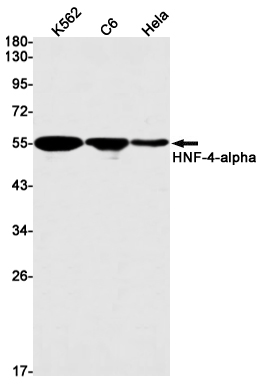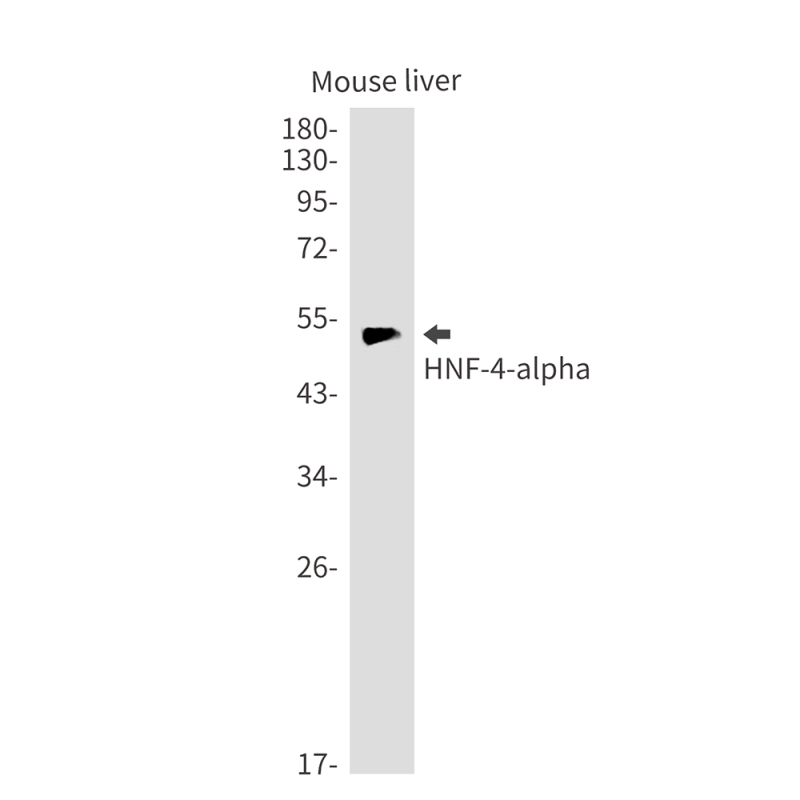

| WB | 1/500-1/1000 | Human,Mouse,Rat |
| IF | 1/20 | Human,Mouse,Rat |
| IHC | 咨询技术 | Human,Mouse,Rat |
| ICC | 技术咨询 | Human,Mouse,Rat |
| FCM | 咨询技术 | Human,Mouse,Rat |
| Elisa | 咨询技术 | Human,Mouse,Rat |
| Aliases | Hnf4; HNF-4; MODY1; Nr2a1; Tcf14; TCF-14; Hnf4alpha |
| Entrez GeneID | 15378 |
| WB Predicted band size | Calculated MW: 53 kDa; Observed MW: 53 kDa |
| Host/Isotype | Rabbit IgG |
| Antibody Type | Primary antibody |
| Storage | Store at 4°C short term. Aliquot and store at -20°C long term. Avoid freeze/thaw cycles. |
| Species Reactivity | Human,Mouse,Rat |
| Immunogen | Recombinant protein of mouse HNF-4-alpha |
| Formulation | Purified antibody in TBS with 0.05% sodium azide,0.05%BSA and 50% glycerol. |
+ +
以下是3-4条关于HNF4α抗体的参考文献及其简要摘要:
1. **"HNF-4α: A Key Regulator of Liver-Specific Gene Expression"**
- **作者**: Sladek, F.M. et al.
- **摘要**: 该研究利用HNF4α抗体通过染色质免疫沉淀(ChIP)和Western blot分析,揭示了HNF4α在肝脏特异性基因(如载脂蛋白和代谢酶基因)转录调控中的核心作用,并验证了抗体在核蛋白检测中的特异性。
2. **"Hepatocyte Nuclear Factor 4α (HNF4α) Suppresses Intestinal Tumorigenesis in Mice"**
- **作者**: Babeu, J.P. et al.
- **摘要**: 通过免疫组织化学(IHC)和Western blot,研究者发现HNF4α抗体标记的蛋白在结肠癌组织中表达下调,表明HNF4α可能通过抑制Wnt/β-catenin信号通路发挥抑癌功能。
3. **"Mutations in the HNF4α Gene Are Associated with Maturity-Onset Diabetes of the Young"**
- **作者**: Yamagata, K. et al.
- **摘要**: 研究使用HNF4α抗体检测患者胰岛β细胞中蛋白表达,发现特定突变导致HNF4α功能丧失,揭示了其与青少年发病的成人型糖尿病(MODY1)的遗传关联。
4. **"HNF4α Is Essential for Embryonic Development of the Liver"**
- **作者**: Li, J. et al.
- **摘要**: 利用HNF4α抗体进行胚胎肝脏组织的免疫荧光分析,证明HNF4α缺失导致肝细胞分化障碍和胎肝发育异常,强调了其在器官形成中的必要性。
这些文献均通过HNF4α抗体探究了其在不同生理病理过程中的功能,涵盖基因调控、疾病机制及发育生物学等领域。
Hepatocyte Nuclear Factor 4 alpha (HNF4α) is a transcription factor belonging to the nuclear receptor superfamily, primarily expressed in metabolic tissues such as the liver, pancreas, intestine, and kidneys. It plays a pivotal role in regulating gene networks involved in embryonic development, cell differentiation, lipid/glucose metabolism, and maintenance of tissue-specific functions. HNF4α exists as multiple isoforms generated by alternative splicing and promoter usage, with HNF4α1 and HNF4α7 being the most studied. Dysregulation of HNF4α is linked to metabolic disorders (e.g., maturity-onset diabetes of the young, MODY1), liver diseases (e.g., hepatocellular carcinoma), and inflammatory bowel disease.
HNF4α antibodies are essential tools for investigating its expression, localization, and functional roles. These antibodies are commonly used in techniques like Western blotting, immunohistochemistry, immunofluorescence, and chromatin immunoprecipitation (ChIP). They typically target specific epitopes within the conserved DNA-binding domain (DBD) or ligand-binding domain (LBD) of HNF4α. Commercial antibodies are often validated for specificity using knockout cell lines or tissues to minimize cross-reactivity with homologous proteins like HNF4γ. Challenges include distinguishing between isoforms due to high sequence similarity and detecting post-translationally modified forms. Reliable HNF4α antibodies are critical for advancing research into metabolic regulation, disease mechanisms, and therapeutic targeting.
×